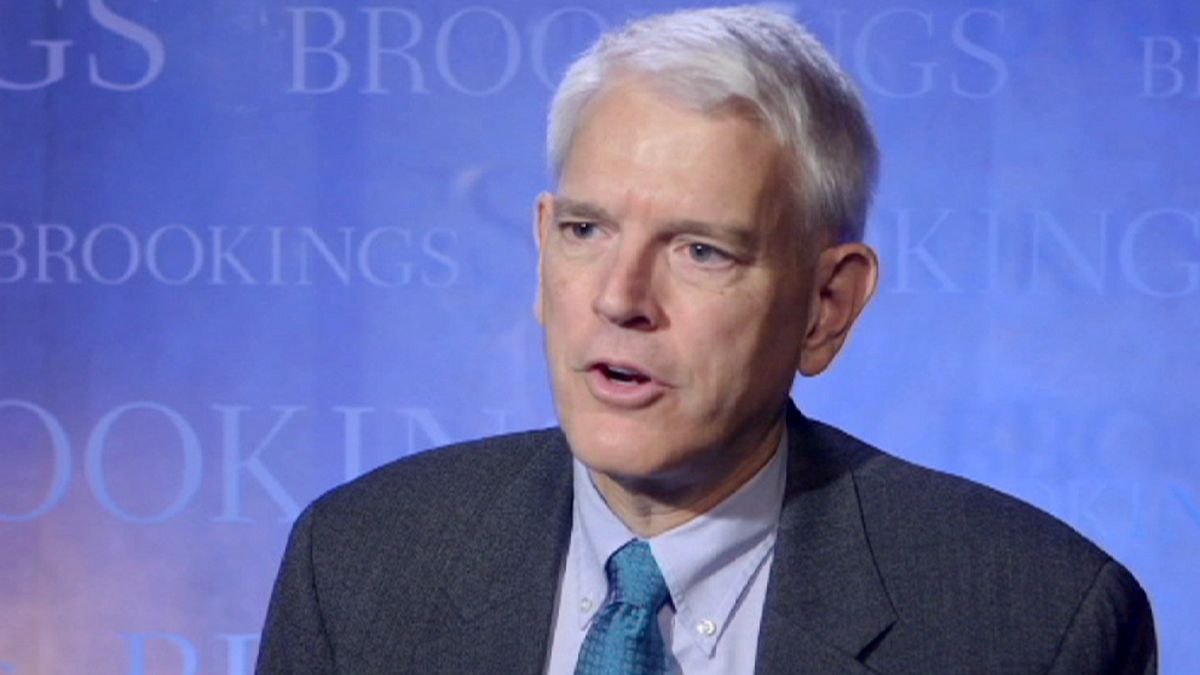Ukraine’s elections have won US President Barack Obama’s approval. He called them a milestone in the former Soviet state’s democratic development. The Organisation for Security and Cooperation in Europe (OSCE) says the polls were free and fair. The ballot box returned an overwhelming pro-European verdict. The performance of Prime Minister Arseny Yatseniuk’s party won a further expression of confidence.
President Petro Poroshenko, also enjoying a victory, surprised everyone at a voting station in eastern Ukraine, dropping by in camouflage. This electoral reinforcement should allow him to pursue peace plans and turn strategically away from Russian influence traditionally exercised over the country. Moscow’s top diplomat, Serguei Lavrov, appeared to give the poll results recognition, albeit muted.
The Russian Foreign Minister said: “I am sure we will have people to talk to in the Ukrainian parliament and in the government, mostly because the leading force in the parliament will be the bloc of Petro Poroshenko, who is our partner, our president’s partner, in reaching the Minsk peace agreements between the Kyiv authorities and the rebels of Luhansk and Donetsk, and these agreements were reached with assistance from Russia and the OSCE.”
But all this is overshadowed: some three million voters in rebel-controlled parts of Ukraine were excluded from Sunday’s democratic push, for reasons involving ceasefire violations in the Donbass region. The separatists in the east intend to hold their own election on 2nd November. Moscow has let on it will recognise those elections, too, while Kyiv and the West would not.
Stefan Grobe, euronews: “Joining me now at the Brookings Institution is former US Ambassador to Ukraine Steven Pifer. Ambassador Pifer, let’s talk about the major takeaways of these elections: A resounding triumph for the pro-European parties. At the same time, pro-Russian forces are nearing extinction. Was this the outcome that Washington was hoping for?”
Steven Pifer: “There are a couple of outcomes that Washington was hoping for and there are two bits of good news in this. One was the election process. The OSCE election observers and other international observers gave the election high marks for being democratic. So, that was the first hope: that this election is democratic, that the results have legitimacy with the population and that they reflect the will of the voters. So, good news on that score. And then the fact that there is going to be a substantial majority of seats that will be occupied by parties that are pro-reform and pro-European Union. I think within Washington that is seen as the logical course for Ukraine. So, the fact that you now have that potential constellation within the parliament, that’s going to be a good sign.”
euronews: “The new government will face immense challenges. There is, of course, Moscow’s unwillingness to accept that Ukraine will forge closer political and economic ties with Europe. Are we going to see a much more aggressive and much tougher stance of Moscow toward Ukraine?”
Pifer: “Well, I think what you have seen up to now so far is the Russians not being ready to facilitate a settlement in eastern Ukraine, and then of course there is the longer-term problem of Crimea which still remains in dispute. Now, the Russians are probably not happy with Sunday’s election result, although on Monday Foreign Minister Lavrov came out and said that Russia would recognise those results. But if you look at what happened, there is only one party, the Opposition Bloc, that remotely would have any pro-Russian sympathies. Now the fact that you have such a low representation in the new parliament of parties sympathetic to Russia really is Russia’s fault. First of all, the aggression against Ukraine has really crystallised a national identity within Ukraine that’s more looking toward Europe as its model. And second, the inability of voters in Crimea and in Donetzk and Luhansk to vote, because they were denied that opportunity, those were areas where you had voters that traditionally had been pro-Russian. So Russia actually depressed the pro-Russian vote in terms of not letting people vote and got a result where you really only have one party that may be sympathetic to Russian policy views.”
euronews: “Can the pendulum swing back again, if the new government is unable to deliver on job creation, the fight against inflation, the fight against corruption?”
Pifer: “I think there is that possibility. Though it does seem to me that when you look at people like President Poroshenko and Prime Minister Yatsenyuk, they seem to understand that Ukraine has this one big opportunity and that missing that opportunity would be hugely destructive for Ukraine and set Ukraine back for years, if not decades.”
euronews: “You know the country very well, you were US ambassador in that country. If you had that post today, what would be your advice to President Obama?”
Pifer: “I think the American message and the European message to Ukraine now needs to be politically you have a line-up that’s going to be as good as it can be in terms of the possibility of building a majority coalition in the parliament, perhaps even large enough where they can get constitutional changes. And some of these things they want to do, for example, decentralisation of power which they need to do to move authority from Kyiv out to the regions, are going to require amending the constitution. You got that kind of majority coalition and a prime minister and the president who can work together. This is Ukraine’s best opportunity, albeit in very difficult circumstances. So the message, it seems to me from the West, needs to be: now really begin to move seriously on reforms that demonstrate the values that you have articulated over the last six or seven months, to really make those things real.”
